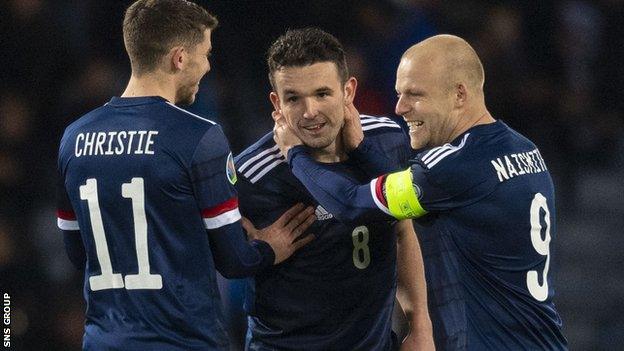Euro 2020 play-offs: Do Scotland have reason to look forward after brutal year?
- Published

John McGinn (centre) scored twice in the 3-1 win over Kazakhstan
Midway through Tuesday's finale to one of the nation's most woeful qualifying campaigns, the footballing Gods may have had their fill of tormenting Scotland. If ever a team needed a break then this was that team.
Lacking energy and urgency, booed off and a goal down to a country ranked 68 places below them in the world order, this was cover-the-eyes stuff. Until good fortune smiled on Steve Clarke and his players this was looking like another one of those nights when the team would be jeered on full-time, when the manager would fetch up in the press conference looking ashen-faced, when another batch of the support would walk out the door vowing never to return.
A lucky deflection eased the pain, a refereeing error helped put Scotland into the lead and a fine third goal lifted the mood.
They got the metaphorical bounce of the ball, but Scotland showed some character in the second half. They showed a competitive pulse. It was their third win in a row. The opposition - San Marino, Cyprus and Kazakhstan - have an average world ranking of 141 but a recovery - if this is what's happening - has to begin somewhere.
This campaign has been bruising. We're probably all too hard-bitten - or should be - to look on these wins as anything other than a pleasing morale boost, a satisfactory conclusion to a brutal year, but what these results also provide is a little respite for Clarke. The manager needed it.
He's a formidable character and the last thing Scotland needed was the sight of him weakening in the face of disappointment. If a guy as strong as Clarke started to get ground down by the difficulties of the challenge then what hope would exist? If he was broken by the job then where do you go next?
At half-time on Tuesday things were deeply worrying, but Scotland rescued themselves and calm has been restored - or what passes for calm in Scottish football.
Clarke will spend the hours until Friday's play-off draw in decent heart. Rather than being bombarded with negativity from all sides he'll spend the four months until Scotland play either Romania, Hungary, Bulgaria or Israel in the semi-final at Hampden in a positive frame of mind. He can look forward in hope rather than looking back in angst.
'At times, it's felt like the worst year'
'We've been battered, but we're building confidence'
You'd hesitate to say that this has been the worst year in the history of the national team, but at times it has felt like it. It's certainly one of the most eventful, in the sense that so much has happened in such a short space of time. A sports data company declared the 3-0 loss in Kazakhstan to be Scotland's worst ever result. The 2-0 victory over San Marino that followed it brought almost as much opprobrium.
Captain Andy Robertson came up with the most striking quote of this and many other campaigns when he said that Scotland had hit "rock bottom".
In 2019, a manager has been sacked, four players have retired and 10 players have won their first cap, four of them in the perennial headache position of centre-back. In their 10 Group I qualifying games, Scotland had six different partnerships at the heart of their defence and conceded 19 goals.
Of the top 40 nations in those qualification groups - half of them played eight qualifiers and half played 10 - only Cyprus conceded more. They shipped 20 goals.
Scotland has two celebrated left-backs in Robertson and Kieran Tierney but began the campaign with Graeme Shinnie playing there and finished it with Greg Taylor. There were seven different starting strikers, from Oli McBurnie to Callum Paterson to Eamonn Brophy to Matt Phillips to Oli Burke to Lawrence Shankland to Steven Naismith, and only three goals from the lot of them.
John McGinn began the year as a defensive midfielder with no international goals and finished it as an attacking midfielder with seven.
Leigh Griffiths didn't play an international match in 2019. Neither did Steven Fletcher. Neither did Tierney. Neither did John Souttar. The withdrawals that dogged Alex McLeish's time carried on under Clarke. Meanwhile, Tierney became an Arsenal player, Robertson became a European champion, McBurnie became a £20m striker, whatever that means in this day and age.
There was noise about Ryan Fraser moving to Arsenal and noise about McGinn moving to Manchester United - for £50m. Ryan Christie marked himself out as a player of major substance at Celtic. Eighteen-year-old Billy Gilmour made his Premier League debut with Chelsea. Scott McTominay, 22, established himself as a starting midfielder at Old Trafford, playing 34 games so far this year including the win over Kylian Mbappe's PSG that put the French team out of the Champions League.
'Hampden needs to be full for semi-final'
Watch: 'I'm very confident Scotland can win home semi'
Clarke knows better than anybody that he has plenty to work with, if only he can improve the situation at centre-half. There are, of course, long-standing issues up front but the concession of soft goals is the thing that's holding Scotland back more than anything.
His success at Kilmarnock revolved around making them more solid and harder to break down. Scotland concede goals from simple balls into the box, from standing off players who accept the invitation to shoot by lashing one into the top corner, from a lack of awareness of danger in their midst, not just against the top teams, but most teams.
Clarke has a long way to go before he makes that situation better, but he'll have more artillery for the fight if, and when, Robertson and Tierney can settle down at left and right-back and when, perhaps, Souttar gets a chance to establish a partnership with Scott McKenna.
There is optimism and you hope there is more luck with injuries and more supporters, too. The semi-final will be at Hampden on 26 March and it needs to be full, or close to full. Tuesday was chilling in more ways than one. The apathy of the fans has been obvious for a long time but this was the most arresting illustration of it.
You can't blame the masses for staying away when they don't have a reason to believe any more. There were stories on Tuesday that even free tickets were being declined. When you can't even give the things away then it's not a problem you have it's a crisis.
Clarke and his players are up against all of that, but they did what was asked of them on Tuesday and won again.
A draw awaits on Friday and a semi-final is coming down the track next year. Three out of three needs to become four of four and four out of four needs to become five out of five. It's not just a battle for qualification they're involved in, it's a fight to bring back those who've given up on them.
